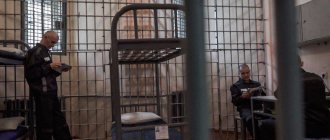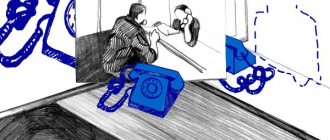Detention center
What is a detention center? This is an institution in which not only those sentenced to short terms stay, but also accused and defendants, that is, those who have not yet been sentenced.
The period of detention in a pre-trial detention center can be quite long, so many people have questions about the standards and accounting for the time spent in a pre-trial detention center.
Currently, the counting takes place in accordance with the Criminal Code of the Russian Federation, Part 3 of Art. 72, that is, the time a subject is kept in custody in a pre-trial detention center is counted towards the terms of imprisonment - 1 day for 2 days or, as people say, “a year for two”, correctional labor - 1 day for 3 days, compulsory labor - 1 day for 8 ocloc'k.
That is, 1 day in a pre-trial detention center is equivalent to:
- 1 day of forced labor;
- 1 day of imprisonment;
- 1 day of arrest;
- 2 days of restriction of freedom;
- 3 days of restrictions on premium;
- 3 days of correctional labor;
- 8 hours of compulsory work.
The pre-trial detention center is intended to hold the following categories of citizens:
- Defendants . They are in the process of litigation.
- Persons under investigation . They are under investigation awaiting the final verdict of the court. The main task of the pre-trial detention center is to deter suspects from committing illegal actions.
- Detained and arrested . Foreign citizens awaiting extradition or extradition to another state.
- Convicts . They are awaiting further transit to a correctional colony or prison.
Also in the pre-trial detention center, criminals who are left behind for housekeeping, cleaning, and cooking are serving their criminal sentences.
The institution houses prisoners sentenced to a term of up to 6 months , who decided to voluntarily stay here with personal written consent.
Criminals from correctional institutions can be transferred or temporarily held in pre-trial detention centers to participate in court cases and investigative procedures in the role of a victim, witness, suspect or accused.
The pre-trial detention center employees ensure that they are not allowed to have contact with the outside world, are responsible for escorting them, and ensure that they are taken to meetings with lawyers, to the prosecutor, or to court.
Functions of the pre-trial detention center
Tasks of pre-trial detention centers:
- respect for the legal rights of convicted persons;
- preventing forgery and interference in the investigation;
- minimizing the risk of suspects and accused hiding from the court and investigation;
- prevention of possible offenses on the part of prisoners;
- ensuring the safety of subjects on the territory of the institution;
- providing convicts with the opportunity to work legally;
- delivery of prisoners to persons entitled to summons.
As a punishment, detention is applied by a court decision in relation to a defendant who has committed a crime punishable by imprisonment for a term of over 3 years.
When choosing a preventive measure, the court ruling must indicate specific facts and circumstances on the basis of which the judge made such a decision.
In exceptional cases, such a preventive measure may be chosen in the presence of one of the following circumstances:
- the identity of the accused person has not been established;
- the subject does not have a permanent place of residence in the Russian Federation;
- the suspect has fled from the court or the preliminary investigation authorities;
- the convicted person violated the preventive measure chosen earlier.
When making a decision, the court also applies the provisions of Art. 97 and 99 of the Code of Criminal Procedure of the Russian Federation.
In Art. 97 of the Code of Criminal Procedure of the Russian Federation states that the court, investigator or interrogating officer has the right to choose one of the preventive measures for the accused, suspect, if there are compelling reasons to believe that the subject:
- may continue his criminal activities;
- will hide from court, inquiry or preliminary investigation;
- may destroy evidence, threaten a witness, or otherwise interfere with criminal proceedings.
When deciding whether to imprison a person suspected of committing a crime, it is necessary to take into account the severity of the crime, as well as information about the identity of the accused, his occupation, state of health, age, marital status and other facts.
Determining this preventive measure is a rather complex process involving multilateral consideration of the case and taking into account many circumstances.
Reception and delivery of parcels
Every prisoner has the right to receive parcels from loved ones. Upon admission, they are opened and examined. This is done in the presence of a commission and a relative, and an act is drawn up in two copies, one of which is provided to the detainee.
Defendants in pre-trial detention can receive parcels from loved ones, as well as letters.
How to draw up an application for transfer to a pre-trial detention center is described in this article.
At the same time, employees receiving parcels are obliged to comply with sanitary conditions and not to reduce the contents of the parcel to such a state that it can no longer be used.
If prohibited objects are found inside, they are confiscated and destroyed. All other contents of the parcel are given to the prisoner in a special room.
Differences between a detention center and a prison
How is a pre-trial detention center different from a prison? These are completely different institutions with different structures and meanings.
A prison is a closed institution with access control; there is no such thing in a detention center; it may even be located on the territory of a district police department.
Those convicted after a court verdict are in prison, and accused and suspects are in pre-trial detention centers.
In prison there are two regimes - general and strict; in the isolation ward there are no regimes . Also significant differences include the fact that women are not sent to prisons; only men are sent there if they were sentenced to more than 5 years or transferred from a colony where they regularly violated the established order.
Women and men are sent to pre-trial detention centers if their term of imprisonment does not exceed six months.
The prison is considered the most severe place of confinement with harsh living conditions. Usually this is a separate complex of buildings, united by a security line with a strict access regime.
This institution differs from a pre-trial detention center by restricting movement with maximum isolation from the outside world.
The prisoner is in the cell 23 hours a day . One hour is allotted for a walk in a strictly guarded place.
Differences also relate to the number of dates, the duration of walks, the amount of money for permissible personal needs and telephone conversations.
General procedures and daily routine
A pre-trial detention center is essentially a transitional stage for the accused between a temporary detention center and a colony. This is a place where people are held against whom a criminal case has already been initiated, but a sentence has not yet been pronounced. Sometimes they have to spend quite a significant period of time there while the court hears their case.
The internal regulations in the pre-trial detention center are ensured by the administration and employees. They are responsible for everything that happens within this institution and are required to report on how they carry out their immediate responsibilities.
Prisoners are required to follow a number of rules regarding them:
- follow all orders that come from them;
- show them respect, and not try to influence them psychologically or humiliate their honor and dignity;
- do not try to interfere with employees doing their work during construction;
- Under escort you must walk with your hands behind your back.
Prisoners must follow the instructions given to them by jail staff.
The general rules include the following:
- convicts are required to follow the established daily routine;
- they should not neglect personal hygiene and basic sanitation rules (this includes keeping themselves and their cells clean and tidy);
- treats all property of the institution with care;
- treats other prisoners with respect and does not try to humiliate or insult them in any way;
- participate in cleaning cells according to the schedule;
- Communication with all citizens (and employees, and other prisoners) must be carried out without the use of jargon or obscene language ;
- Do not cover the camera lens or lights in the camera;
- exchanging clothes and other items among themselves is prohibited;
- It is not allowed to take medications without the permission of the medical staff and to have larger quantities of them than for 1 day of use;
- Communication with other prisoners using prohibited methods is strictly prohibited.
Chat on the Internet
Finding yourself in the new harsh atmosphere of the walls of the isolation ward, a person experiences strong psychological pressure. To stabilize the psyche, the support of loved ones is especially required.
With the development of modern technologies, relatives and friends of the convicted person can contact the prisoner much faster.
In 2022, you can find many services online, thanks to which you can send a letter to a pre-trial detention center via the Internet, but it is better to use the official websites of the Federal Penitentiary Service of the Russian Federation.
The rules for writing a letter to a pre-trial detention center are regulated in Order No. 205 of the Ministry of Justice of the Russian Federation, which states that correspondence must necessarily go through censorship, except for documents from the court and government agencies.
For correspondence, it is better to use the official resource provided by the Federal Penitentiary Service of the Russian Federation. They even developed a mobile version of this site, available for installation on a smartphone.
Advantages of correspondence via the Internet:
- speed and convenience of sending and receiving;
- accelerated review by the censor;
- the ability to compose a letter under different circumstances and in any place.
The censor can check the received letter immediately after sending . It simply deletes unwanted parts of the message without throwing out the entire letter. You can also attach photographs electronically.
The person under investigation can also respond via email . To do this, he writes a letter on plain paper and gives it to the censor, who scans it and sends it to the addressee’s email address. This service is paid, but its cost is affordable.
Since letters are strictly censored, you should not mention any information or details of the criminal case filed against the prisoner, because this is not always to his benefit.
For example, unscrupulous employees can transfer information to criminals for a monetary reward.
You should also know that the paperwork does not stop, and it is better not to provide information on this case, because the information may get to the investigator conducting the investigation.
What should not be included in letters:
- information about the persons involved in the case;
- facts concerning the actions of the convicted person that were not known to the investigation;
- your attitude to this criminal case;
- data on other types of communication with the prisoner;
- any ciphers;
- profanity or jargon;
- information about drugs or weapons;
- photos of an erotic nature;
- calls to disrupt the existing state. building.
How to transfer to a pre-trial detention center
Many people are very interested in the question of how to transfer a parcel to a pre-trial detention center, because a large number of suspects end up there.
Usually, people enter a pre-trial detention center with a minimum set of things, since no one prepares for imprisonment in this place in advance. It is the responsibility of relatives and friends to provide the prisoner with everything necessary.
Only a limited list of products and things can be transferred to the isolation ward. The weight restrictions of the parcels should be taken into account. For pre-trial detention centers, the maximum volume of transfers is 30 kg per month.
The following foods are prohibited:
- need to cook (cereals, fish, meat);
- packaged in vacuum containers (canned food, sausages, milk);
- have a shelf life of less than 3 days;
- must be stored at temperatures below +8°C.
In the parcel you can send:
- cigarettes, even if the prisoner does not smoke, as they serve as a kind of prison currency;
- loose leaf tea, goes to the common fund for cooking chifir;
- instant noodles;
- bouillon cubes, vegetable oil;
- salted lard, taken in a plastic bag;
- onion garlic;
- sugar, but not more than 2 kg, instead of it you can put honey in unlimited quantities;
- cookies, gingerbread;
- candies, preferably caramel, preferably without wrapper;
- dried fruits have beneficial properties and significant volume with minimal weight.
The transferred products undergo a thorough check - bread is cut into pieces, packs of cigarettes are opened, liquid is poured out, and bulk is poured out.
How to send a parcel
A parcel can be delivered to a prisoner in a pre-trial detention center in three ways:
- in person;
- through the pre-trial detention center store;
- through a specialized online store.
When applying in person, you must fill out an application indicating the following information:
- Full name of the addressee;
- Full name of the sender, address and degree of relationship with the arrested person;
- list of transferred products;
- date and signature.
After inspection by the responsible employee, his signature and date are placed on the parcel in the “Checked” column.
Also, most packages are sent through the in-house store or kiosk of the detention center, where everything needed is on sale. The advantage of this method is that all products have already been checked, and everything will reach the recipient safe and sound.
The sender must contact the financial department of the pre-trial detention center and write a statement in 3 copies , which indicates the full list of products to be transferred. After payment of the application, the transfer is made to the prisoner.
Sending necessary products through Internet services, which act as intermediaries between the sender and the pre-trial detention center, is also becoming popular.
For example, in the store https://www.sizo-mag.ru there are more than 130 types of candies alone.
The online store https://zakazperedachi.ru is also popular , which offers more than 500 types of goods allowed for transfer.
This is a fairly convenient delivery method, since relatives do not need to go on a long journey to carry out the transfer. To place an order, fill out the “Cart” and click on the “Place an order” button.
The main thing is to be responsible when filling out the data and not to make mistakes in the recipient’s full name and the name of the institution.
Search/inspection/seizure of prohibited items
Each accused person is subject to a personal search procedure, which includes both a search of the citizen himself and his belongings. A personal search is carried out based on gender. He is photographed and fingerprinted.
If a detainee has a bandage or plaster applied, they are removed only under the supervision of a medical worker.
During this procedure, a protocol is kept, and if prohibited items are found in the pre-trial detention center, they are confiscated and a report is drawn up on them in several copies. These objects are then sorted and can be given to relatives or friends of the prisoner, at his request. The latter must be noted in the application.
How to behave in a pre-trial detention center
When taking the accused into custody, the main question remains: how to behave for the first time in a pre-trial detention center?
Prisons of freedom have their own rules of behavior - official, established by the authorities and informal between prisoners.
Official rules of conduct include prohibitions, for example, you cannot:
- go beyond the zone line;
- leave the premises without permission from management;
- disrupt the daily routine;
- communicate with convicts from other cells through correspondence;
- engage in the use and production of intoxicating substances;
- draw tattoos;
- gambling for personal gain;
- prevent observation through the peephole;
- unauthorized repair of cameras, plumbing, communication devices and lighting.
You should not shout and rush at the duty officer and the guard, proving your innocence, you can end up in a punishment cell and be mistaken for a mentally ill subject.
Also, do not try to insult the staff with whom you will have to establish contact to communicate with family and friends.
Unofficial rules of conduct
To establish yourself in the eyes of other convicts, you should politely say hello at the door and inquire about a free seat.
Then talk to the observer, who will ask about the name and nickname, article, attitude towards non-traditional sex. In a conversation, you should not use swear words or try to make yourself look superior to others.
If a lie is detected, you will have to answer to the fullest extent of the local law. After the conversation, the new prisoner will be shown where his place is in the cell.
In the cell, sharing the contents of part of the parcel and inviting other prisoners to a common meal are encouraged.
Not in the camera:
- communicate in a raised voice, swear;
- fight, especially with legs;
- sit down on someone else's bed without the owner's invitation;
- eating food that has fallen on the floor;
- use things that have fallen into the trash can or toilet;
- use the toilet if someone is eating in the cell;
- take other people's products and things;
- insert yourself into a conversation without invitation;
- shake hands with the “offended”, take their things.
Do not rush to reveal all the details of your life; for a long time you will be surrounded by strangers, often aggressive.
If someone persistently tries to ask about the circumstances of the case or details of his personal life, then, most likely, this is not a friendly person, but an informer or a person looking for profit.
So, a pre-trial detention center, which stands for and is translated as a pre-trial detention center, is a state institution with a rather complex structure, strictly regulated by law.
Conditions in a pre-trial detention center are similar to a prison; prisoners adhere to the prison regime, and free movement is limited.
Video: How it works - A day in a pre-trial detention center
The colony. Red and black
You can end up in a colony either after a temporary detention center or a pre-trial detention center, or without going through these stages. For example, you may be sentenced and taken into custody right in the courtroom.
Andrey:
Convicts can be placed in either a general regime or a strict regime, it all depends on the severity of the crime. One way or another, there are no camps left in the Sverdlovsk region that have not fallen under the influence of convicts who are actively cooperating with the administration. Yes, that’s true, the administration, by transferring powers to such convicts, is committing arbitrariness and sometimes lawlessness. A terrible word - chaos. Such camps and zones are called “red”, and this is associated with blood. In such camps, all movements occur in formation or running. While singing songs, sometimes of an offensive nature. I personally know first-hand about torture, humiliation and beatings, so I can say with complete confidence: in the Sverdlovsk region there is chaos on the part of the administration employees and their accomplices in the person of the convicts.
Once in the quarantine department in the penal colony, upon arrival in the zone, almost 100% of newly arrived convicts are there for two weeks. During this time they undergo a medical examination. For your information, there are particularly cruel activists working in quarantine in the “red” zones, collaborating with the administration. After all, it is in quarantine that the initial “breaking” of new arrivals begins. Everything is selected, even hygiene items. A nightmare begins for those who respect themselves and others. Administration employees, as a rule, are not in quarantine, so all powers are assigned to the “active”. All illusions disappear for those who end up in such camps. I have personally heard more than once from those who create chaos: “They will be afraid, they will not sit down again, they will be obedient.” I have been judged many times and I can assure you that those who have gone through this hell become different, and not for the better. Morality breaks down, human values disappear, compassion and empathy die. Only a few, having gone through the nightmares of the camps, become stronger without losing their human appearance.
“Black” camps are different - everything there is based on honesty and decency, insults to individuals or family and friends are unacceptable. Fighting and violence are not welcome. For such a thing there is a strict demand, after which few people will want to violate human principles. They will always help you in word and deed; they will not remain indifferent to sadness and grief.
It is extremely difficult to remain a human in a “red” colony; it requires fortitude and endurance. Many are forced to write receipts: “I will cooperate with the administration.” Currently, videos of torture and “confessions” are being recorded everywhere. Activists and the administration warn that in case of disobedience, all video materials will be shown on domestic TV.
In many “red” camps there are workshops for the production of certain products. The pay is meager, it’s true, but it’s an option to avoid torture and abuse.
Alexei:
The prevailing concept in society that in the “red” zones the rules of the internal life of prisoners are set by the administration of the correctional colony, and in the “black” zones - by thieves, are erroneous. The entire policy of the internal life of both the “red” and “black” colonies is set by the administration, and here everything depends on who carries out the administration’s instructions - the “actives” or the thieves (prisoners who honor thieves’ ideas and openly promote them). I want to see more of humanity about the camps, since the thieves who carry out the instructions of the administration must still maintain the defining image of thieves’ piety so that the bulk of the prisoners respect them.
For example, I came to a “black” colony. I ended up in quarantine. The thieves organize to ensure that new arrivals are treated normally by the “red” prisoners, who are also called “goats” in slang. Tea, cigarettes, sweets and other necessities are allocated from the common fund for the period of quarantine (14 days). Even if very modestly, but every day and for everyone. If, God forbid, during quarantine the “goats” in such a camp raised their hand against you, then the thieves must react. Therefore, in such “black” camps there is less torture and violence from the “goats” against the mass of prisoners. Although, to be honest, all this is present there, but to a lesser extent than in the “red” camps.
So I arrived at the “red” camp and ended up in quarantine. Here from the first minutes they start beating you. The “Goats” apply pressure during the entire 14 days of quarantine. By talking with you, the “goats” obtain information about your financial well-being. They look at your reaction to the concessions they offer, for which you must pay, and give you a cell phone to call home, while telling you that for the call, your relatives must put a certain amount of money on the phone or bank card. Naturally, in conditions when you are beaten and humiliated 24 hours a day, a call home is priceless, and you pay... But from now on you will pay for the entire term. They will milk you.
Alyona:
One thing can be said about the women’s colony: the “baul system.” Buy, sell, exchange. Concepts as such exist when it is profitable or when there is nothing to lose, and basically everyone who is friends with common sense strives to leave on parole. After all, mothers are there. And when the drug haze subsides, the brain falls into place, then an understanding comes of how little a person needs to be happy: a house, a child, a family. I don't know a single woman who wouldn't want to go home. A woman has nothing to do in a colony, so she shouldn’t go there.
What a colony, such a routine. The difference is in the number of checks - two or three. And the rest depends on the detachment in which you live, the type of your activity and the mental state of the colony administration.
Even in the zone you can keep yourself busy and diversify your leisure time. Some read, some watch films, some take part in amateur activities, some knit, write, draw. Who cares? If a person wants to self-realize, self-express, self-educate - in a good sense of these words (not to be strange and not to shake the regime) - a person will find something to do for leisure and will not become dull over the years that are sentenced to him.
Sokolov:
There is a very simple saying: “Don’t believe, don’t be afraid, don’t ask.” She needs to be guided. Also – listen more, talk less. When a person ends up in a colony, he usually internally resigns himself to the fact that he will be in prison. The shock goes away and he begins to actively communicate. But at first it’s better to listen more and try to think, then just talk.







